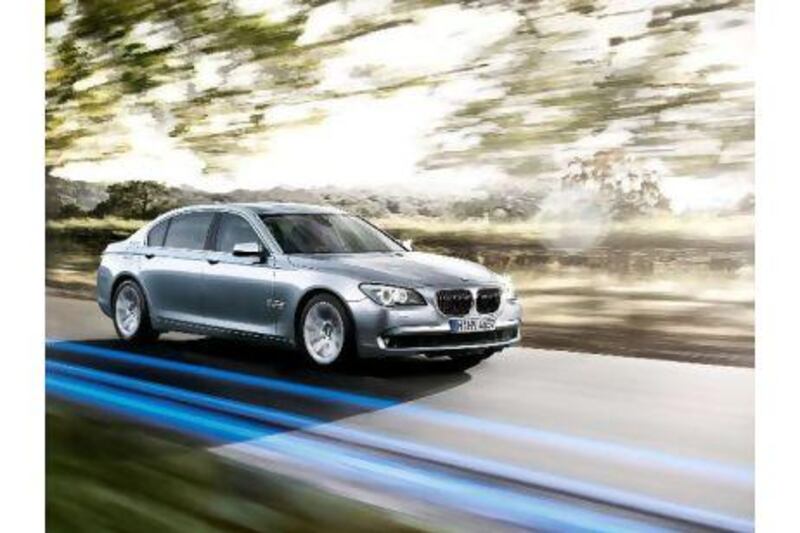How does one measure environmental efficacy? Is it a simple measure of fuel economy? Or is it really all about CO2 emissions? Will performance continue to matter? Does driving enjoyment factor into the equation or is that something we are destined to leave behind forevermore?
What of the cost of all this planet-saving technology? Is it a top five buying decision criteria or simply a mitigating factor? Are we willing to spend anything to feel virtuous? Or is "green" to remain forevermore the privilege of the monied and sanctimonious? Does which segment a "green" vehicle plays in matter? And how much of a hybrid's greenness is reality and how much is just cynical marketing to tree-huggers' sensibilities? After all, being seen to be green is as important these days as actually being green, to consumer and automaker alike.
I do not ask these questions rhetorically. I spent the entire Christmas holiday tooling around in a BMW ActiveHybrid 7, BMW's attempt at making its topflight 7 Series saloon just a little less toxic. More than a little of those two weeks was spent wondering where the big hybrid fit into the entire cost/benefit ratio of electric vehicle technology.
Essentially, what BMW has done is to add a small electric motor (20hp and 210Nm of torque) and sandwiched it between the 750's engine and transmission. That means there are now eight pistons, two turbochargers, eight gears and, yes, an electric motor all tasked with driving the big 7's rear wheels (unlike normal 750 xDrives that power all four wheels). Making things perhaps a little more dramatic (and certainly confounding the tree[hugging issue) is that BMW has actually upped the twin turbo'ed V8's power output in this environmentally conscious version, from a merely colossal 400 horsepower to a monumentally overboard 440hp. Factor in the electric motor's boost and BMW says there's 455 semi-sustainable horses available when the driver lets the reins loose.
Even more impressive, since turbocharged gasoline engines and electric motors both are known for their low-end torque, is the incredible pulling power at low speeds. Honestly, it feels as if the Active 7's combined 700Nm could pull the Queen Mary if you could just find a trailer that could support the big boat's weight. Anyone looking for more low rpm torque better start hunting diesel motors. And a big one at that. Acceleration to 100 kilometres an hour takes but five seconds (an impressive number when you remember that this long wheelbase version of the 7 weighs in at a "healthy" 2195 kilograms), less than half a second slower than the V12 760.
But, wait, you say, hybrids aren't about performance; their promise is a greener earth where we consume less of the precious dino juice. How successful is it in that regard?
Well, that's where that aforementioned perspective comes in. BMW claims about a 30 per cent fuel economy advantage over the regular 750i. While that's a laudable - though probably optimistic - advantage, is it really worth the additional technology, or perhaps, more appropriately, the added cost? It's an important consideration since the ActiveHybrid 7, at Dh550,000, costs almost a whopping Dh100,000 more than the garden-variety long-wheelbase 750Li. And, besides, the 12.2L/100km that I averaged is hardly the frugality that brings tears to eyes of Al Gore.
But then, that's where that whole perspective thing I alluded to might come in. First, as wasteful as those 12.2L may seem compared with a Prius or even a diesel BMW, it's better than the 14L/100km I averaged in Hyundai's Equus just the week before. It's also much better than BMW's own V12-powered 760 whose performance is almost identical to the ActiveHybrid 7's.
So what is the final determination? Well, considered on a simple dirham-per-advantage basis, the ActiveHybrid 7 makes absolutely no sense. You'll be driving to the moon and back before the hybrid's fuel economy advantage pays that the additional cost back. You also lose the regular 750's all-wheel-drive system. The Hybrid 7 just does not currently present a pragmatic cost/benefit ratio.
On the other hand, no one buys an ultra-luxury saloon pragmatically. It may send the environmentally concious in paroxysms of rampant socialism, but the monied will buy whatever humungously overpriced and overpowered exotic catches their fancy. If we can somehow convince them that eight turbocharged cylinders and an electric motor will indeed belittle the proletariat as well as 12 normally aspirated pistons - and save a precious few barrels of oil along the way - then perhaps the ActiveHybrid 7 is a success.
I told you it was all about perspective.






